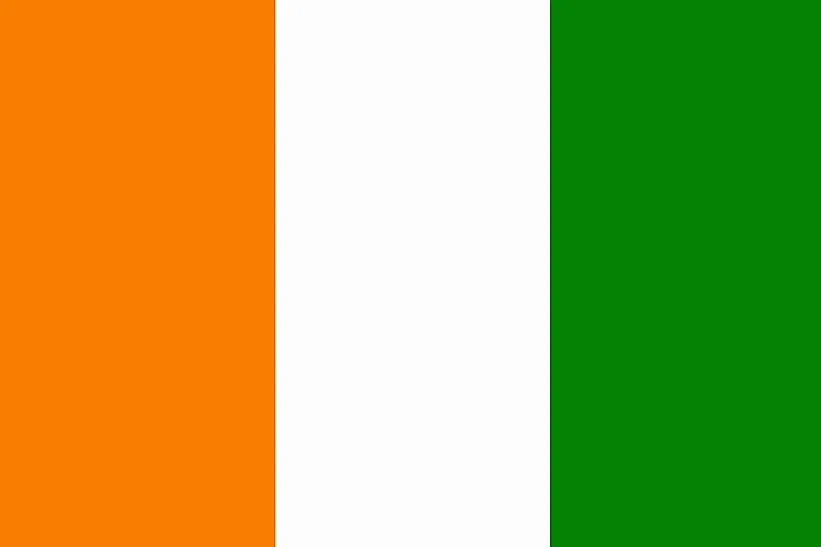
아이보리 코스트
| 대륙 | 아프리카 |
| 자본 | 야무수크로 |
| 인구 | 23,740,424 |
| GDP | $87.12억 |
| 1인당 GDP | $3,600 |
| 다이얼링 코드 | +225 |
| ISO 코드(2글자) | CI |
| ISO 코드(3글자) | CIV |
About Ivory Coast
Welcome to Ivory Coast (Côte d’Ivoire), a nation that combines rich cultural heritage with remarkable economic growth in West Africa. With approximately 26.5 million people occupying 322,463 square kilometers, Ivory Coast has emerged as one of Africa’s most dynamic economies, particularly known for its leadership in cocoa production and cultural diversity.
지리적 특징과 자연의 아름다움
Ivory Coast’s geography transitions from coastal lagoons in the south to savanna in the north. The country features four main natural regions: the coastal fringe, characterized by lagoons and sandy beaches; the fertile forest zone; the savanna transition zone; and the northern savanna.
The Tai National Park, a UNESCO World Heritage site, preserves one of West Africa’s last primary rainforests, hosting rare species including pygmy hippopotamuses. The Mount Nimba Strict Nature Reserve, shared with Guinea, features unique biodiversity and dramatic landscapes.
The country’s rivers, including the Bandama, Comoé, and Sassandra, play crucial roles in agriculture and transportation. The southwestern region features some of West Africa’s most dramatic landscapes, with rolling hills and dense forests.
문화 유산과 전통
Ivorian culture reflects the diversity of its more than 60 ethnic groups, each contributing unique traditions, arts, and customs. The country’s cultural mosaic includes the Akan peoples (including the Baoulé), the Mandé, the Kru, and many others, creating a rich tapestry of traditions.
Traditional arts include elaborate mask-making, particularly among the Dan and Senufo peoples, wooden sculpture, and textile arts including famous Baoulé kente cloth. Music and dance play central roles in cultural life, with each region maintaining distinctive styles and ceremonies.
Ivorian cuisine features cassava, plantains, rice, and various sauces, with attieke (fermented cassava) being a national favorite. The country’s coffee and cocoa culture has influenced both its economy and social traditions.
역사 여행
Ivory Coast’s history spans from ancient kingdoms through French colonization to independence. The region was home to various states and ethnic groups, with significant trade networks developing before European contact.
After gaining independence from France in 1960, Ivory Coast experienced remarkable economic growth under its first president, Félix Houphouët-Boigny, becoming known as the “Ivorian Miracle.” Recent decades have seen the country emerge from periods of challenge to reclaim its position as a regional economic leader.
현대 경제 환경
Today’s Ivory Coast is West Africa’s largest economy, driven by agriculture, services, and increasing industrialization. The country produces about 40% of the world’s cocoa and has significant coffee, palm oil, and cashew production.
The government’s development plans have focused on economic diversification, infrastructure development, and poverty reduction. Abidjan, the economic capital, has emerged as one of West Africa’s most dynamic cities, with growing financial and service sectors.
국제 관계 및 글로벌 포지셔닝
Ivory Coast maintains active participation in regional and international organizations, playing a key role in West African affairs. The country hosts the African Development Bank and has strong ties with both traditional and emerging partners.
알고 계셨나요?
• Ivory Coast is the world’s largest exporter of cocoa beans?
• The country’s economic capital, Abidjan, is often called the “Paris of West Africa”?
• The Basilica of Our Lady of Peace in Yamoussoukro is the largest church in the world?
• Traditional Senufo art has significantly influenced modern Western art?
결론
Ivory Coast represents a remarkable combination of economic dynamism and cultural richness in West Africa. From its coastal lagoons to its northern savannas, from its traditional arts to its modern industries, the country continues to evolve while maintaining its cultural heritage. As it addresses challenges including sustainable development and social inclusion, Ivory Coast remains committed to its role as a regional leader and model of economic transformation.





